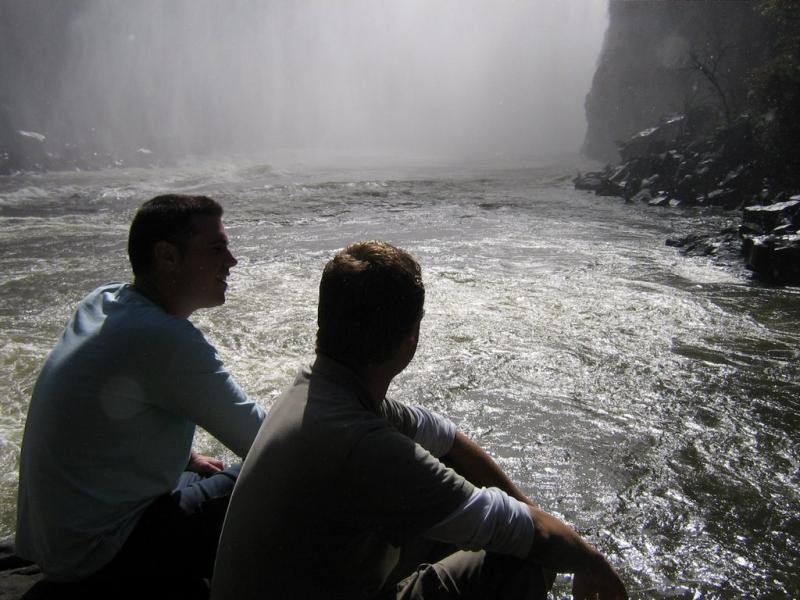Seven Expressions Of Courageous Coaching

Courageous coaching! What would “courageous coaching” look like for you? There are many ways to approach the subject of courage in coaching. As a trainer of wellness & health coaches here are some of the ways I would like to see courage show up for the coaches we educate.
1. The Courage To Stand For NCRW- Naturally Creative, Resourceful And Whole
In the foundational coaching book Co-Active Coaching (http://www.thecoaches.com/why-cti/buy-the-book) , the authors say “We start with this assertion: people are, by their very nature, creative resourceful and whole.” They finish their paragraph with “In the Co-Active model it more than a belief – it is a stand we take.” I love the courage in that statement. When coaches are functioning at their best, serving their clients to the fullest, they are taking that stand. It is like a line drawn in the sand that coaches will defend against all who would ridicule, diagnose, or demean their clients or disenfranchise them of their human dignity. The power of this stand feels not only like the compassionate expression of unconditional positive regard, but like the solid feeling of someone who stand with you. Standing alone facing those who would treat you as broken, inadequate, and incapable, it is like the feeling of an ally stepping up from behind you and you feel their shoulder touching yours as you face your challenge together. The coach’s courage brings out your own.
The courage of the coach is called forth here as they work in systems that would still adhere to old diagnostic models that label people. The wellness field sometimes deals with its challenge of leveraging large numbers by labeling people as “high-risk”, “obese” (according to completely unreliable BMI charts), or by the tag of their health challenge (diabetic, etc.). Here our courage comes forth as we welcome that client and treat them, despite what others say, or even what the discouraged clients believes about themselves, as naturally creative, resourceful and whole. We may be the first person in a human-helper role who has treated them this way.
“If you treat an individual as he is, he will remain how he is. But if you treat him as if he were what he ought to be and could be, he will become what he ought to be and could be.”
― Johann Wolfgang von Goethe

2. Courage To See The Potential In All And To Confront And Challenge
As we take this courageous stand to hold our clients to be naturally creative, resourceful and whole, there are times when we may believe this about our clients more than they believe it about themselves. Our clients come to us with lessened self-efficacy from repeated failure experiences and sometimes lack of support and even discouragement heaped upon them by others who did not see them as capable of much in their lives. From our perspective we may see possibilities and capabilities in our clients not evident to them. Here we can courageously confront and challenge our client to do more. As we demonstrate our belief and faith in our client’s abilities and capacities, they may rise to the challenge and succeed to a degree that surprises them.
Challenging clients to take a next step, to walk three times next week instead of two, to have that crucial conversation with their boss all hinges on the strength and depth of the coaching relationship. I challenge clients very little early on in coaching. As our alliance grows and they know that I am truly their ally, holding that their agenda is the only agenda, then a challenge is welcomed instead of mistrusted.
Coaches may also have to confront the unspoken conflicts that can arise in coaching. One of the bravest things that coaches do is to invite exploration of how can the coaching be improved. Right in the middle of the coaching process coaches will ask how they can work better with their clients. When coaches tune in to the tone of voice, to the increasing resistance, to the “agreements” made to new action steps that are mouthed in lukewarm fashion of compliance instead of embraced with motivation, the wise coach is alerted that the basic coaching relationship needs attention. The courageous coach then talks about “the elephant in the living room” and clears the air.
It may take real courage to make a referral. It’s easier, at first, to just ignore or minimize how our client is struggling. We may fear that our client will be offended, or that they will no longer like or trust us. We may try to fake our competency in areas where we are insufficiently prepared. Such coaches make numerous suggestions for solutions, whether the issues are nutritional questions or more psychological in nature. We have to be courageous enough to say “I don’t know.” We have to hold the client’s safety and wellbeing far above our own fears.
 3. Courage To Do Process Coaching
3. Courage To Do Process Coaching
Research tells us that 60% of all decisions are made emotionally, not logically. Emotion permeates the experience of working on changing our behavior. When we strive to change our belief systems (like the person who has always believed they must please others all the time and finally realizes that managing their own stress means saying “no” at times) there is always an emotional component. In wellness & health coaching we almost always encounter the emotional side of life as our clients deal with attempting work no body image, success and failure experiences, etc. Thinking that coaching is just a process of logically formulating plans, setting “goals for the week” and holding people accountable to those goals is not only naive, it is actually condescending, dismissive and disrespectful. So, coaches must be skilled in the art of process coaching, helping people process emotion so they can connect it to motivation and action.
Beyond the skills required for process coaching, is the courage to enter the world of emotions with one’s client. Certainly the confidence that comes from learning and practicing such skills enables the emergence of the courage we need. However, there is more than just confidence involved here. Can the coach face his or her own fears around dealing with emotion? Is the coach grounded enough in their own emotional balance to stay centered as they walk down the path of emotion with their client? Can the coach distinguish between the emotion of the client and their own feelings? Can the coach realize how safe they, themselves, truly are as their client deals with feelings?
We might call it emotional maturity coming from life experience. When one has learned from processing their own feelings, gained insights and applied those insights to their lives, fears around emotion lessen. Overcoming family of origin programming around such fears can be very challenging. If we can just learn that feelings are our allies, not our enemies, we can open up to the growth process that allows us to gain such maturity.
 4. Courage To Dance In The Moment
4. Courage To Dance In The Moment
When my wife and I go dancing (as we love to do), I often listen to the music for a few bars and decide if it’s a number that suites our style before I propose getting out on the floor. In coaching it’s more like being out on the floor already and going with whatever music is played! As our clients conduct the band, the music can shift at any time. The client who seemed to simply be working on smoking cessation is suddenly talking about the profound sense of loss that has come from avoiding their old smoking companions during breaks. Dance with it!
It takes courage to go “out on the dance floor” when you don’t know what will happen next. Be centered in the confidence you have in your skills, but also draw upon the positive qualities you know you have. Coaching presence and your ability to be non-judgmental, empathic and compassionate will allow you to face, with your client, challenges of all sorts.
Trusting the coaching process is advice I am constantly giving coaches in training. Yet, part of coaching is knowing that the “coaching process” is something much bigger than a “protocol”, a rigid coaching format or worst of all a script. We can’t always anticipate the next move by our dancing client. Part of the true coaching process that we trust is letting go of what we thought was going to be our work today and going in the direction that emerges. Yes, structure is our friend, and our client’s friend as well, however structure has to accommodate flexibility. A client may have a day when resolving a conflict with the coach on direction and how to work together, or a time when a personal crisis takes over. On such occasions, feel free to toss the old agenda of reporting in on action steps out the window and deal with what is right in front of us.
5. Courage To Stand For Transformation
When a client reports that coaching has helped them change their life, that they are a “new person”, that what happened in the coaching process far exceeded their expectations, then we know that we have co-created, with our client, transformative coaching. As our clients work to improve their lifestyle, what is key to remember is that our clients will need to be living that new and healthier way for the entire rest of their lives. Yes, it’s good to reduce blood pressure points, A1C scores and percent body fat numbers. Yet, if all we are measuring is how many times Joe or Martha walked each week for the last few months, have we really helped our client as much as we could have?
Part of what coaches in the world of corporate coaching face is standing for transformation, not just single variable increases that can be conveniently measured and paid for. Coaching the whole person takes time. Yet, if we don’t want to see that client coming back through the revolving door of coaching, or perhaps of the treatment end of the healthcare system (with yet another chronic illness) then working courageously with our clients to help them make sustainable lifestyle improvement just makes good sense. When more than just some change in a measurable behavior takes place, when the person’s self-esteem, self-efficacy and connectedness with additional and lasting support systems can rise, then we know that lasting lifestyle change can thrive. Work to help your clients transform their lives.
 6. Courage To Do Your Own “Work”
6. Courage To Do Your Own “Work”
The oft-used phrase “knowing when and how to get yourself out of the way” has great import for coaching. When there are issues in our lives that are so unresolved, so demanding of our awareness, that we are distracted by them, influenced by them and/or almost pulled to them unconsciously they will interfere with effective coaching. Such issues are likely to push us into projecting our own feelings on to others. The coach who is carrying around unresolved anger sees more anger in their client’s expression of emotion. We believe that others “need” to work on the same “stuff” that we are wrestling with. The danger continues with such coaches ascribing feelings or beliefs to clients that they really don’t possess. The probability of collusion increases dramatically. We give the struggling client a quick free-pass on their accountability because of our own feelings about their challenge. The border between effective process coaching and the world of psychotherapy/counseling becomes much more ambiguous for such coaches.
In all of my years as a psychologist practicing psychotherapy and working with colleagues in universities, clinics, and private practices, I observed that the truly effective therapists were the ones who were continually working on their own personal growth. They were open to looking at their own shortcomings and how to improve. Socially they were open and easy to get to know. The ineffective therapists were much more defended and resistant to self-examination, much less seeking out of personal growth. They maintained a “clinical presence” with their “patients” and were more socially distant. The lesson for coaches is equally clear.
It takes courage to look at ourselves. Who knows what lies hidden if we crack open Pandora’s Box? A coach who is afraid of not being able to handle the contents is most likely going to coach with the fear of being surprised by what a client might say. Instead of clearly distinguishing then if we can proceed with coaching, or encourage a referral to a mental health professional, such a coach may instead retreat from dealing with feelings altogether and rigidly stick to talking about goals and action steps.
Do we need to finish up all of our unfinished business emotionally before we can coach effectively? Of course not. We all have moved forward effectively in life with some weight left in our backpacks. If, however, we’re carrying an iron anvil in that pack, it definitely will weight us down and get in the way of our coaching work. So, take on the personal challenge if need be, to seek out the ways for you to do the intrapersonal work that you need to do and be a better coach!
“The unexamined life is not worth living.”
Socrates
 7. Courage To Grow
7. Courage To Grow
When clients realize that wellness is ultimately about personal growth as a whole human being, transformation takes place. Motivation for lifestyle improvement then becomes easy. When a coach realizes that that personal growth is not something to fear, but something to embrace, their professional growth mirrors that unleashing of potential. Growth means change. Change means loss. Scary stuff. Sometimes it is most tempting to hang on to the status quo, even if it is stifling, unfulfilling and stagnating. The personal growth journey is always a twisting path and there is seldom much of a view of what’s around the next bend. So yes, it takes courage to be open to growth and perhaps even more to seek it out.
Growth is about joy, but also about being uncomfortable. Our growing edge is sometimes tender, sometimes a place where pain has taken place. Our inner-critic is always on hand to discourage us, to shake our confidence, to have us consider all of the ways we can fail, or that we are even worthy of the benefits that it might bring.
Yet, when we risk and succeed, when we calculate our leap and then we take it the rewards are great. Personal development and professional development overlap and we thrive. Personal growth opportunities take on many shapes. We grow mostly from being open to experience life and what comes to us. At other times, we know that stretching ourselves might require seeking growth out. Signing up for a new opportunity to socialize or engage in adventure, to travel outside the walls of the “all-inclusive”, or simply to allow ourselves to experiment with that which has been the hardest for us to do, can all yield surprising growth. It might be giving ourselves permission to risk being vulnerable and let an intimate relationship grow. It might be backpacking through Europe solo. The “what” depends upon where your own growing edge is located.
Courageous coaching can show up in many ways as we have seen. Courageous coaching pays off in greater integrity, confidence, personal growth and ultimately in better service for our clients.
In the astonishing book, Facing The Lion, Being The Lion: Finding Inner Courage Where It Lives (http://marknepo.com/books_finding.php) , poet and cancer survivor, Mark Nepo urges us to face things in life. “…facing ourselves, each other, and the unknown. It is something we cannot do without, for facing things is what courage, at its most fundamental level, is all about. Without this, we replay and pass our suffering on to others repeatedly.”
 For those who grow, there comes a time to Face The Lion, and by doing so, Become The Lion.
For those who grow, there comes a time to Face The Lion, and by doing so, Become The Lion.
Later this month I will be hosting a Real Balance Free Monthly Webinar with Real Balance Faculty member Joshua Steinfeldt as my guest. His topic will be “What Are Coaches Afraid Of? An Exploration Of Courage And Coaching Mastery”. A recent grad of the Masters Degree Program in Positive Psychology at the University of Pennsylvania where Martin Seligman and others in the Positive Psychology Movement teach, Joshua will be presenting the fascinating work he did on his Masters Thesis.








Only registered and logged in readers can leave comments.